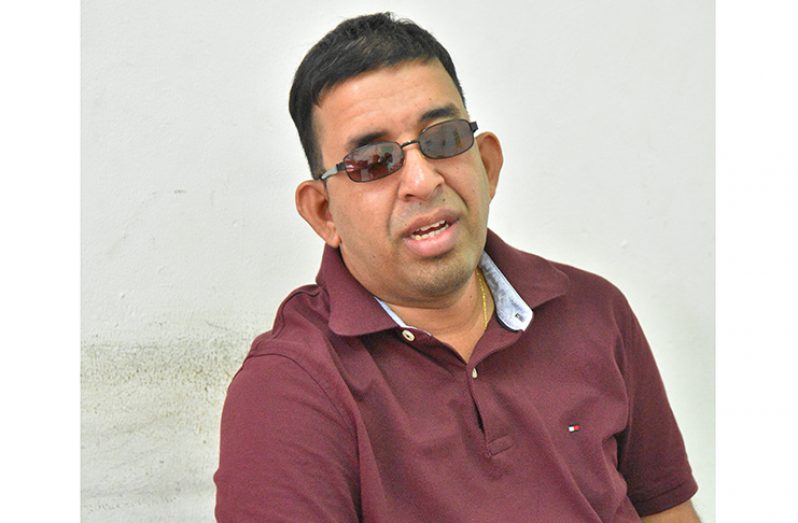– Blind Society Project Coordinator
The rehabilitation and integration of persons with blindness is a crucial process that is absent locally, Guyana Society for the Blind Project Coordinator, Ganesh Singh said.
Singh was diagnosed with glaucoma in his early teens and before he was out of that age period he had lost his sight completely.
The disease, which is irreversible, has inspired him to become an advocate for persons with disability.
However, being fairly well-known in some circles, Singh now puts the spotlight on the absence of programmes and systems which enable blind individuals to be re-trained to function in society and to do so much more quickly.
“In Guyana, we do not presently have any system or programme for rehabilitation and reintegration of persons with vision disabilities into society,” Singh said.
He added: “If someone acquires blindness we all know it’s a traumatic experience for that person and their families. That is where counsellors, rehabilitation specialists and assistants come in. [They should] sit with that individual, explain to them, share case studies of inspirational stories of how blind persons were able to restart their lives [and] say to the families what are some of the things that are going to be difficult at first.”
As Singh pointed out, these flaws in the health system make him remember the days when he had limited social interaction and was confined indoors as a result of a lack of these provisions, including awareness of opportunities available for the blind.
“I’ve come from a positon where, after I got blind, I became someone with a disability and because of the lack of awareness of what existed for my rehabilitation and reintegration into society, I was home for five years as a shut in… as a result, it motivates me to help others not to be in a position like that,” he said.
The coordinator recommends that blind individuals, upon losing their sight, be taught how to use the cane, to utilise the public transportation system and to do basic chores in their home.
GET EYES TESTED REGULARLY
However, he reminds the public that in order for the results surrounding glaucoma to improve, persons must realise the importance of getting their eyes tested regularly, something that not many Guyanese take seriously.
“Glaucoma is a silent thief of sight. It damages your peripheral vision so you don’t really notice any difference with the distance you see.
“At the age of seven, I started wearing glasses, very thick ones [and] at that time I don’t know if I wasn’t told or I wasn’t smart enough to understand what really was going on. Until one of my eyes started getting swollen [because] the pressure was so extremely high, I went to some overseas doctors that came here… and they diagnosed I had glaucoma,” he said.
Singh told the story of how even as his sight gradually diminished, he like many others, was still afraid of dealing with the reality that there was truly something terribly wrong with his eyes.
“I really didn’t tell my parents, I didn’t tell anybody the distance I was unable to see. There are many times that I probably could have gotten knocked down on the road but God was always with me.
“I used to cross the road based on sound because I could have noticed cars up close. When I used to stand on the road to catch bus to come to school, because I was living on the East Coast, I would basically hear a vehicle coming and I could tell if it was a bus, a car or a truck,” Singh told.
Singh was a frequent visitor to the ophthalmologist at the Georgetown Public Hospital Complex [GPHC] which could not do much at the time to help glaucoma patients.
SIGNIFICANT IMPROVEMENT
Answering to how much the service for persons with eye complications has improved at the GPHC over the years, he said: “Significantly… at GPHC they now do laser surgery.
“This, when I was 13 was not available in Guyana, I had to travel overseas to get that done. They do vision field testing and a number of other tests now. Things are more modern and it’s available for free,” he said.
Even as the Guyana Society for the Blind faces several challenges, one of which is their reliance on volunteerism as there is no paid staff, Singh said there are many programmes today which make the lives of visually-impaired individuals easier.
Reiterating the need for programmes which restore these persons into society, he said: “There are a number of apps that allow blind persons to be independent because that’s all persons with disabilities want — to be independent. But the majority of blind persons who are out there are not aware of these things because we do not have a rehabilitation programme.”
Nonetheless, the society continues to train its members to utilise the Jobs Access With Speech (JAWS) programme, which is installed on computers and helps to further their education through their CXC programme.
Summarising his appeal for the final time, Singh said: “It’s all about letting people know what is there once they acquire blindness. Yes, your life is going to be changed significantly but, at the end of the day, you still can live a normal life.”



.jpg)








